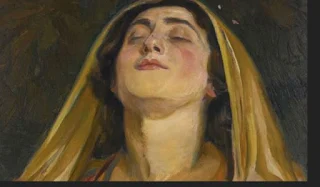But the
hand of the LORD was heavy on the people of Ashdod, and He ravaged them with
tumors, both Ashdod and its territory. 1st Samuel 5:6
God Judges in The End
The Philistines had beaten Israel in two decisive battles killing 34,000 Israeli soldiers. In that massive defeat the Philistines captured the ark of God which Hophni and Phineas had foolishly allowed the army of Israel to carry into battle, thinking it alone would give them victory. When the 98-year-old Eli heard the news that the ark had been captured, he fell off his seat breaking his neck and died. He had ruled as high priest for 40 years.The
Philistines took the ark into their city of Ashdod and as a trophy of war
placed it in the temple of their fish god, Dagon. The next morning, they found
Dagon’s statue on its face, prostrate before the ark and the God of Israel.
They put the statue back on its pedestal only to find the following morning their god prostrate
and broken before the ark. All that was left was the statue’s torso. It was
such a shock and embarrassment that their god had been so disgraced that never
again would a priest of this false god step on that area (v 5:5).
God’s chastisement
was just getting started. He struck Ashdod and its surrounding territories with
tumors. The Hebrew word means an inflammation of a boil or ulcer especially of
the anus. The archaic KJV English is the word emerods from which we get
our word hemorrhoids, and it pains me to say they did have these tumors in
their “secret parts” (v 5:9). God is never mocked (Galatians 6:7) and always
has the end in mind for those willing to bend over backwards to do so.
Ashdod began
passing the ark around to other Philistine cities which suffered the same consequences.
After 7 months of hot potato, they thought the better part of valor would be to
return the thing that had them saying, “Uh, no thanks, I think I’ll stand,”
when offered a chair.
To pacify
the God of Israel, the Philistine priests had them make a “trespass offering”
of 5 golden emerods and 5 golden mice. The vermin had apparently also brought
disease on the land. The ark was loaded on a new cart with two cows and sent south.
The ark of God was recovered by the Jews and was once again in Israel’s hands.
We currently
live in biblical times where we are daily seeing evil people defying and mocking the Living God. But is God really mocked?
We need not lose hope for He has always proven Himself faithful to His word and
shown Himself powerful to save.
Let us not
be weary in doing what is right and let us not give up hope that He will remain
true to His promises to return and make all things new. We shall reap a harvest
if we do not give up (Galatians 6:9). God continues to work in all power,
wisdom, and strength to bring righteousness and restoration, and be assured, He always triumphs in the end.
Ken






